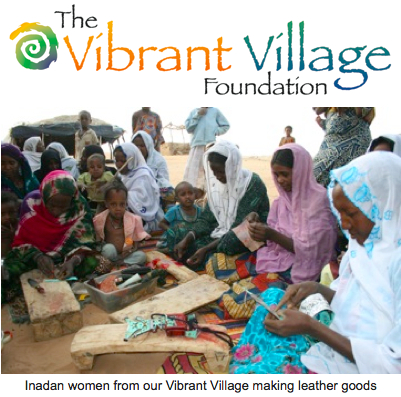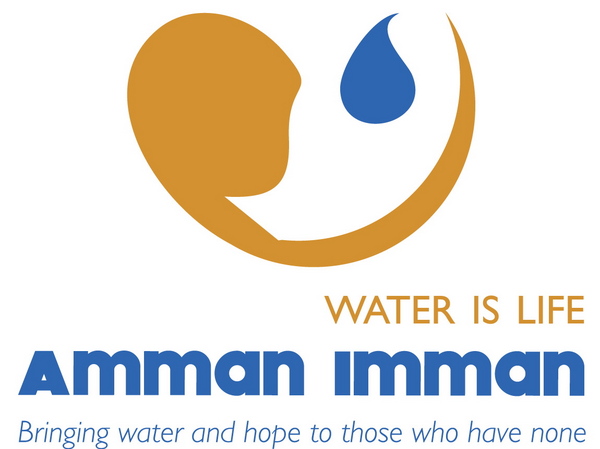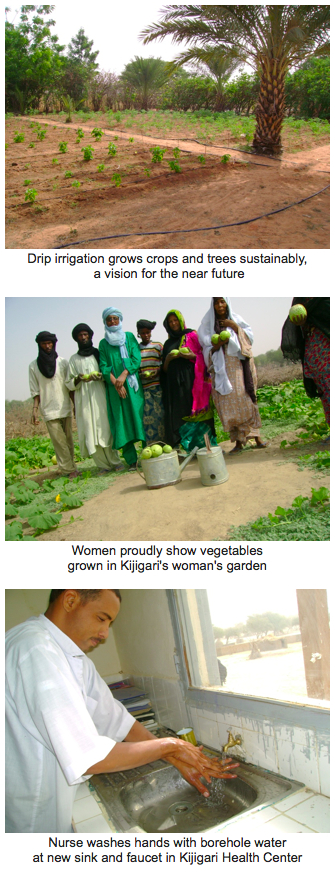|
Here's what you can do to help
Goal = $40,000 |
Dear Friends of the Azawak,
Before anything else, I’d like to wish all of you a wonderful Holiday Season. Merry Christmas, Happy Hanukkah, Happy Kwanzaa, and many blessings to you, our dear friends and supporters!
Denis, Fassely, and I arrived safely in Niger a few weeks ago. We’ve been very active implementing projects that will have a life-changing impact for the Azawak. Here’s some of what we’ve been working on…
The Vibrant Village Borehole
 We are happy to announce that we’ve initiated the process to build our next borehole, which will solve the water supply issues for 5,000 to 30,000 people, depending on the time of the year. We’ve chosen a village and its surrounding communities that harbor thousands of Tuareg and Fulani who currently have no immediate access to water. For the time being, we’re keeping the community’s name anonymous to protect our security. I’ll refer to it as the Vibrant Village, in honor of our primary funder, the Vibrant Village Foundation. I’ll share our progress in the upcoming weeks.
We are happy to announce that we’ve initiated the process to build our next borehole, which will solve the water supply issues for 5,000 to 30,000 people, depending on the time of the year. We’ve chosen a village and its surrounding communities that harbor thousands of Tuareg and Fulani who currently have no immediate access to water. For the time being, we’re keeping the community’s name anonymous to protect our security. I’ll refer to it as the Vibrant Village, in honor of our primary funder, the Vibrant Village Foundation. I’ll share our progress in the upcoming weeks.
Food activities
We are also fine-tuning the choices for our upcoming activities in Tangarwashane, Kijigari, and Tchinwagari(our past borehole communities). Their current immediate priority is food. According to the World Food Program (WFP) Niger is suffering its worst food crisis in over a decade (and the third it's experienced in the past six years). Between 60% to 90% of this year’s crops did not reach harvest - which has been estimated at approximately 500,000 tons of food that will not be available to feed Niger's populations. Many grains and basic food supplies (oil, sugar, etc) are difficult – sometimes impossible -- to find on the market. Those that can be found have tripled in price, and are unaffordable by most rural populations. We are already witnessing the repercussions of this food crisis. Many of our families eat only one small meal a day. Children are the first to suffer from severe malnutrition (including starvation), that may lead to problems long after this crisis has subsided. In fact, the UN has estimated that 330,600 children under age five have or will fall victim to this year's drastic food shortage in Niger.
To help alleviate the pressure that this year’s food crisis has placed on our villages, we are developing both a short-to-medium term as well as a long-term strategy. For immediate relief, we plan on helping supply their food banks. As a longer term solution, we will continue supporting agricultural/gardening efforts by introducing a drip irrigation project (based on the premise of using the borehole sustainably to grow food). We will eventually propose a small ruminant program for the women. However, for the time being, the people must feed themselves before they have the luxury to feed their animals.
On the positive end of things, the drip irrigation project will be less costly than we had anticipated (around $4,000). However, an effective food bank program for the three communities will cost around $20,000, whereas we had budgeted for only $5,000. We too are falling victim of the soaring grain and food prices. We are looking into options, such as bringing in cheaper grain from outside the country to lower the cost.
Health and Revenue-Generating Activities
We had planned on conducting health and revenue generating activities along with food based activities. However, given the communities’ current priorities, and the cost of conducting these activities, we will determine additional projects a few weeks from now.
Positive news from the Field
Despite their current challenges, our communities show ongoing proof of growth and resiliency. The women of Kijigari continue to cultivate their garden, using both marsh and borehole water. Thanks to this, they grow squash and zucchini to help supplement their food.
The local government contributed piping and plumbing to bring Kijigari’s borehole water to the village’s health center, one of few such facilities in the remote Azawak. The health center now has a faucet with running water, and the birthing room has been equipped with a faucet and sink!
Please Join our Holiday Campaign!
We have received some very generous donations for our work this winter. The Vibrant Village Foundation has given us $130,000, and another devoted supporter and committed friend has pledged $30,000. We are asking our supporters to help us raise the additional $40,000 by the beginning of the year, to see our projects to fruition, and support ongoing follow-up throughout the year. Please help!
Here's what you can do:
1) Make a donation. Large, medium, small - it all adds up to improving lives and bringing water, food, and hope!.
2) Help us fundraise by creating your own fundraising page and reaching out to your community of family and friends. "It takes a village" of people helping to make a difference!
3) Spread the word. Forward this email; share the links on Facebook, Twitter, etc.
Thank you for being a part of our vision to bring water and hope to the Azawak!
Gratefully yours for the Children of the Azawak,
Ariane
Before anything else, I’d like to wish all of you a wonderful Holiday Season. Merry Christmas, Happy Hanukkah, Happy Kwanzaa, and many blessings to you, our dear friends and supporters!
Denis, Fassely, and I arrived safely in Niger a few weeks ago. We’ve been very active implementing projects that will have a life-changing impact for the Azawak. Here’s some of what we’ve been working on…
The Vibrant Village Borehole
 We are happy to announce that we’ve initiated the process to build our next borehole, which will solve the water supply issues for 5,000 to 30,000 people, depending on the time of the year. We’ve chosen a village and its surrounding communities that harbor thousands of Tuareg and Fulani who currently have no immediate access to water. For the time being, we’re keeping the community’s name anonymous to protect our security. I’ll refer to it as the Vibrant Village, in honor of our primary funder, the Vibrant Village Foundation. I’ll share our progress in the upcoming weeks.
We are happy to announce that we’ve initiated the process to build our next borehole, which will solve the water supply issues for 5,000 to 30,000 people, depending on the time of the year. We’ve chosen a village and its surrounding communities that harbor thousands of Tuareg and Fulani who currently have no immediate access to water. For the time being, we’re keeping the community’s name anonymous to protect our security. I’ll refer to it as the Vibrant Village, in honor of our primary funder, the Vibrant Village Foundation. I’ll share our progress in the upcoming weeks.Food activities
We are also fine-tuning the choices for our upcoming activities in Tangarwashane, Kijigari, and Tchinwagari(our past borehole communities). Their current immediate priority is food. According to the World Food Program (WFP) Niger is suffering its worst food crisis in over a decade (and the third it's experienced in the past six years). Between 60% to 90% of this year’s crops did not reach harvest - which has been estimated at approximately 500,000 tons of food that will not be available to feed Niger's populations. Many grains and basic food supplies (oil, sugar, etc) are difficult – sometimes impossible -- to find on the market. Those that can be found have tripled in price, and are unaffordable by most rural populations. We are already witnessing the repercussions of this food crisis. Many of our families eat only one small meal a day. Children are the first to suffer from severe malnutrition (including starvation), that may lead to problems long after this crisis has subsided. In fact, the UN has estimated that 330,600 children under age five have or will fall victim to this year's drastic food shortage in Niger.
To help alleviate the pressure that this year’s food crisis has placed on our villages, we are developing both a short-to-medium term as well as a long-term strategy. For immediate relief, we plan on helping supply their food banks. As a longer term solution, we will continue supporting agricultural/gardening efforts by introducing a drip irrigation project (based on the premise of using the borehole sustainably to grow food). We will eventually propose a small ruminant program for the women. However, for the time being, the people must feed themselves before they have the luxury to feed their animals.
On the positive end of things, the drip irrigation project will be less costly than we had anticipated (around $4,000). However, an effective food bank program for the three communities will cost around $20,000, whereas we had budgeted for only $5,000. We too are falling victim of the soaring grain and food prices. We are looking into options, such as bringing in cheaper grain from outside the country to lower the cost.
Health and Revenue-Generating Activities
We had planned on conducting health and revenue generating activities along with food based activities. However, given the communities’ current priorities, and the cost of conducting these activities, we will determine additional projects a few weeks from now.
Positive news from the Field
Despite their current challenges, our communities show ongoing proof of growth and resiliency. The women of Kijigari continue to cultivate their garden, using both marsh and borehole water. Thanks to this, they grow squash and zucchini to help supplement their food.
The local government contributed piping and plumbing to bring Kijigari’s borehole water to the village’s health center, one of few such facilities in the remote Azawak. The health center now has a faucet with running water, and the birthing room has been equipped with a faucet and sink!
Please Join our Holiday Campaign!
We have received some very generous donations for our work this winter. The Vibrant Village Foundation has given us $130,000, and another devoted supporter and committed friend has pledged $30,000. We are asking our supporters to help us raise the additional $40,000 by the beginning of the year, to see our projects to fruition, and support ongoing follow-up throughout the year. Please help!
Here's what you can do:
1) Make a donation. Large, medium, small - it all adds up to improving lives and bringing water, food, and hope!.
2) Help us fundraise by creating your own fundraising page and reaching out to your community of family and friends. "It takes a village" of people helping to make a difference!
3) Spread the word. Forward this email; share the links on Facebook, Twitter, etc.
Thank you for being a part of our vision to bring water and hope to the Azawak!
Gratefully yours for the Children of the Azawak,
Ariane











No comments:
Post a Comment